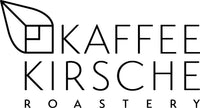Abadatezuka COOP Rwanda Omniroast
Herkunftsland: Rwanda
Region: Western Province
Aufbereitung: Natural
Varietät: Bourbon
Anbauhöhe: 1850–2200 MASL
Geschmack: Honigmelone, Erdbeere, Kirsche / honeydew melon, strawberry, cherry
Körper: lang anhaltend / long-lasting
Süße: intensiv / intensive
Säure: mild / mild
_________________________________
Die Abadatezuka-Kooperative ist eine Gruppe von Kleinbauern in der Westprovinz Ruandas, die ihre Kaffeekirschen an die Cyato-Waschstation liefern, sie befindet sich im Cyato-Sektor des Distrikts Nayamasheke in dieser Region. Die Erzeuger hier bauen Kaffee in Höhenlagen bis zu 2.200 Metern über dem Meeresspiegel an, und die Waschstation befindet sich auf 1.850 Metern über dem Meeresspiegel. Die Waschstation wurde 2017 eingerichtet. Eine interessante Facette des Kaffees ist hier, dass die einheimischen Honigbienen, die in und um den Nyungwe-Wald leben, in dem der Kaffee angebaut wird, zum Teil für das "einzigartige Profil" dieses Kaffees verantwortlich sein sollen. Die von den Bienen unterstützte Bestäubung, der fruchtbare Boden (schwarzer Humus und Sand) und das kühle, vom See beeinflusste Klima, der Nähe zum Kivusee sei Dank, tragen zu den Aromen in der Tasse bei. Die Bauern verwenden keine synthetischen Mittel, weder als Dünger noch zur Schädlingsbekämpfung.
Abadatezuka Cooperative is a group of smallholder farmers in Rwanda's Western Province who deliver their coffee in cherry to the Cyato Washing Station, which is located in the Cyato sector of the Nayamasheke district in that region. The producers here grow coffee at elevations all the way up to 2,200 meters above sea level, and the washing station is located at 1,850 meters above sea level. The washing station was established in 2017. One interesting facet to coffee here is that the native honeybees that live in and around the Nyungwe forest where the coffee is grown are said to be responsible in part to the "unique profile" this coffee has. The bee-assisted pollination, fertile ground (black humus and sandy soil), and cool lake- affected climate thanks to the area's proximity to Lake Kivu contribute to the flavors found in the cup. The farmers use no synthetic inputs, either as fertilizers or as pest control.










